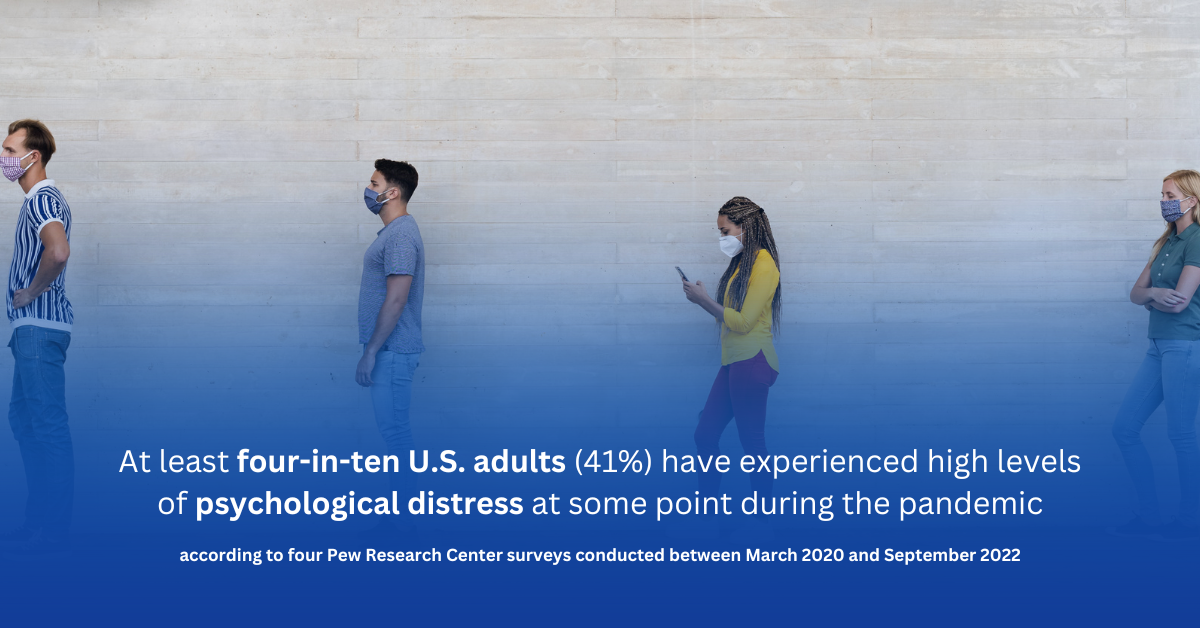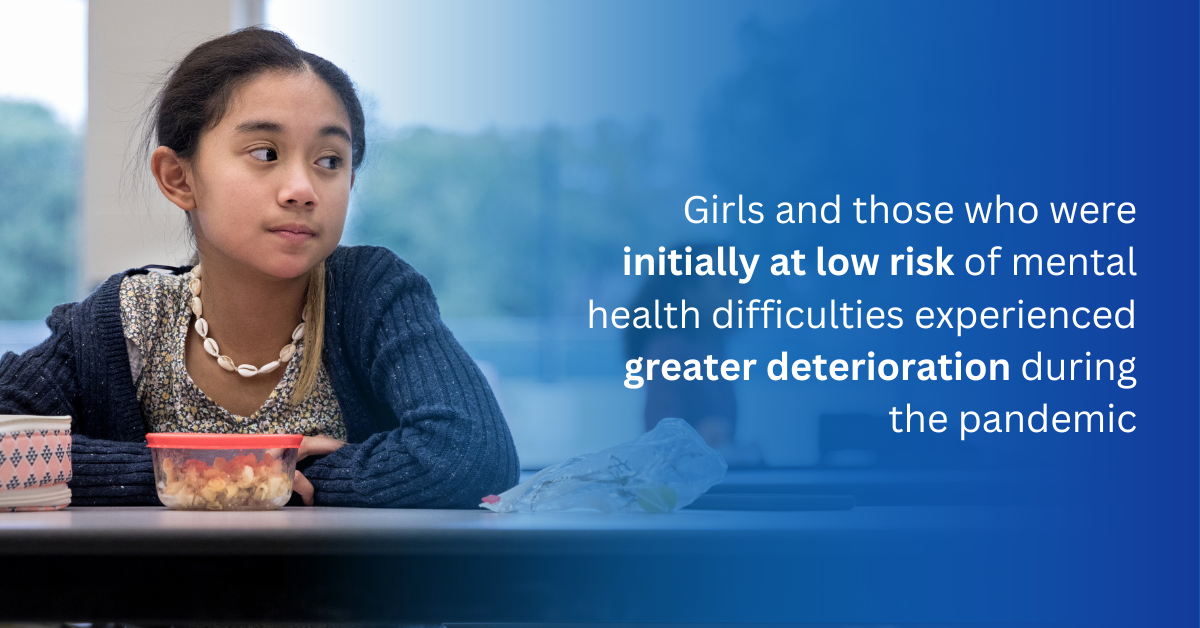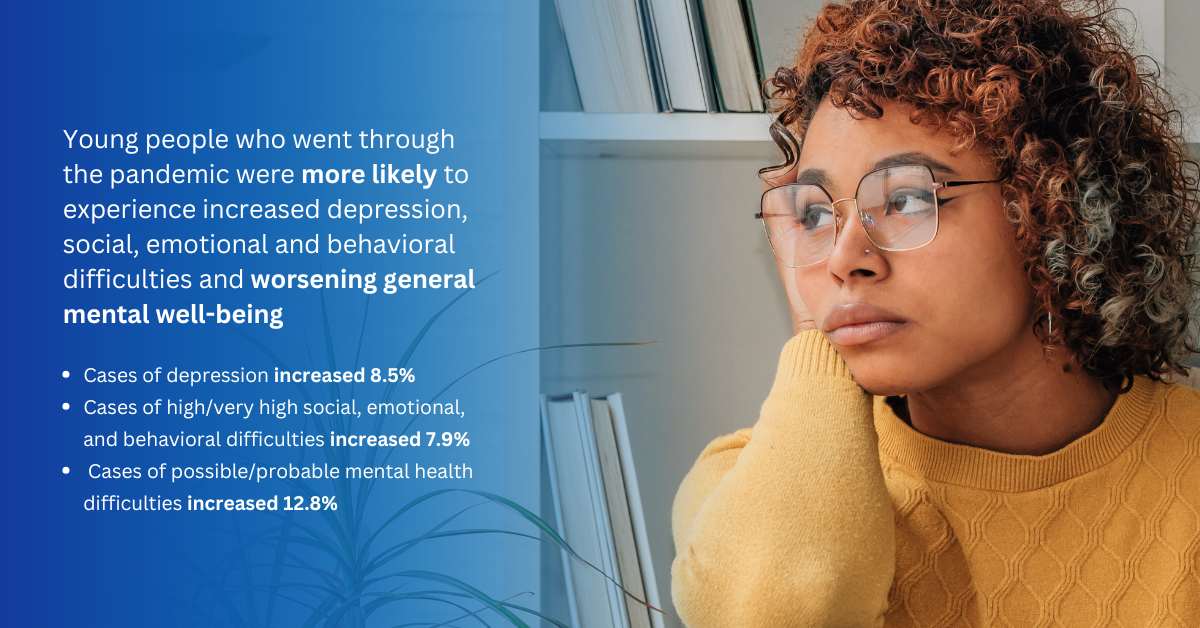A Look at Post-Pandemic Mental Health: Data and Resources
Trauma-informed care (TIC) plays a crucial role in supporting mental health, especially for young adults adjusting to college life. Trauma can originate from various experiences, such as childhood adversity, difficult transitions, or widespread events like the COVID-19 pandemic. Addressing trauma in the college setting is essential for fostering emotional well-being and academic success.
The Impact of the COVID-19 Pandemic on Mental Health
A study involving 195 college students found that 71% of respondents reported increased stress and anxiety due to the pandemic. 91% of students expressed concerns about their health and the health of loved ones, while 89% had difficulty concentrating. Sleep disruptions were also prevalent, with 86% reporting altered sleep patterns and 82% stating heightened concerns about their academic performance.
Broader data highlights that over 52% of students had trouble falling asleep, while 43% were not getting sufficient sleep. Stress and anxiety impacted 78% of the student population, leading to a notable decline in mental health. 80% of students reported severe sleeping disturbances, with 27% of males and 33% of females affected by clinical insomnia.
These statistics reflect a more significant issue of young adults being overwhelmed by academic and personal challenges, compounded by the uncertainty of the pandemic. The aftermath of these experiences continues to manifest in ongoing mental health struggles, even as routines normalize.

Mental Health Before and After the Pandemic
Before the pandemic, many college students had already experienced high levels of stress and anxiety due to academic pressures, social transitions, and the demands of college life. Data from 2019 indicated that about 20% of college students dealt with significant anxiety, while 16% faced depression. These challenges only escalated during the pandemic.
After the pandemic, reports of anxiety and depression spiked. Students, particularly those in their first year, often reported feeling overwhelmed by academic and social pressures. Difficulty adapting to online learning environments, reduced physical activity, and a general sense of disconnection contributed to a sharp increase in mental health issues. The pandemic increased feelings of isolation and disrupted routines that students relied on for structure and well-being.
The growing call for more psychiatric mental nurse practitioners, family nurse practitioners, women’s health nurse practitioners, and pediatric nurse practitioners is at an all-time high.
Common Mental Health Concerns Among College Students
Several mental health issues have become increasingly prevalent among young adults on campus. These include:
Anxiety Disorders
Social anxiety, generalized anxiety, and panic disorders are among the most common. Academic pressure, social isolation, and uncertainty about the future all contribute to worsening anxiety levels.
Resources for Anxiety Disorders
Here are some excellent resources for students with anxiety disorders:
- American Psychological Association
- Anxiety & Depression Association of America
- Anxiety Resource Center
- The Center for Addiction and Mental Health
- Social Anxiety Association
Depression
Feelings of sadness, hopelessness, and a lack of motivation can significantly impact a student's academic performance and social engagement. Students with depression may withdraw from activities and relationships that previously brought them joy.
Resources for Depression
- National Institute of Mental Health (NIMH)
- Substance Abuse and Mental Health Services Administration (SAMHSA)
- MedlinePlus – Depression
- National Alliance on Mental Illness (NAMI)
- U.S. Department of Health & Human Services – Office on Women’s Health
Sleep Disorders
Sleep disturbances are widespread, often caused by poor sleep hygiene, irregular schedules, and stress. Insomnia and related sleep conditions can be exacerbated by academic pressure and personal anxieties.
Resources for Sleep Disorders
- Centers for Disease Control and Prevention (CDC)
- National Heart, Lung, and Blood Institute (NHLBI)
- American Academy of Sleep Medicine (AASM)
Post-Traumatic Stress Disorder (PTSD)
Students who have experienced trauma, whether personal or collective, may suffer from PTSD. This condition can manifest as flashbacks, heightened anxiety, and difficulty coping with stress.
Resources for Post-Traumatic Stress Disorder (PTSD)
- National Center for PTSD
- Substance Abuse and Mental Health Services Administration (SAMHSA)
- American Psychological Association (APA)
- Mayo Clinic – Post-Traumatic Stress Disorder (PTSD)
- Cleveland Clinic – PTSD
Substance Use Disorders
Some students turn to alcohol or drugs as a means of coping with stress and trauma. Unfortunately, substance use can aggravate mental health conditions, leading to a cycle of dependency.
Resources for Substance Use Disorders
- National Institute on Drug Abuse (NIDA)
- National Institute on Alcohol Abuse and Alcoholism (NIAAA)
- American Society of Addiction Medicine (ASAM)
Eating Disorders
Disorders such as anorexia, bulimia, and binge eating are exacerbated by stress and are particularly common among young adults, especially women. These disorders can have profound implications for both physical and mental health.
Resources for Eating Disorders
- National Eating Disorders Association (NEDA)
- Academy for Eating Disorders (AED)
- Eating Disorders Coalition for Research, Policy & Action
- F.E.A.S.T. (Families Empowered and Supporting Treatment of Eating Disorders)
- Eating Disorder Foundation

Where to Get Help
Fortunately, campuses offer various resources to support students facing mental health challenges:
- Campus Counseling Centers: Most universities have counseling centers that provide free or low-cost therapy. These centers are typically staffed with licensed professionals trained to address the specific issues young adults face.
- Online Therapy and Counseling Apps: Platforms such as BetterHelp and Talkspace make therapy more accessible to students. These services can be accessed from the comfort of one's dorm room and are often available around the clock.
- Peer Support Programs: Some universities have taken peer mentoring programs where students can connect with others who have shared similar experiences. These programs offer emotional support and help foster a sense of community.
- Crisis Helplines: Services like the National Suicide Prevention Lifeline or now the 988 Lifeline offer immediate support for students facing severe anxiety, depression, or suicidal thoughts. Campus-specific hotlines may also be available.
- Academic Accommodations: As awareness of mental health challenges grows, many universities are implementing academic accommodations to help students cope. This may include mental health days, flexible deadlines, or remote learning options.
The Role of Trauma-Informed Care
Trauma-informed care involves recognizing the presence of trauma and its impact on individuals. This approach is convenient in college settings, where students may be dealing with the long-term effects of trauma while managing academic responsibilities.
It is important to create an environment where students feel physically and emotionally safe. This includes ensuring they are aware of available resources and that the campus atmosphere is non-judgmental.
Building trust between students and mental health professionals is key to creating an effective support system. Transparency and confidentiality are critical to making students feel comfortable seeking help.
Trauma-informed care encourages students to take an active role in their healing. This means providing them with treatment choices and ensuring they feel heard throughout the process.
Universities that implement trauma-informed care practices often see improvements in student well-being. By recognizing trauma and creating a supportive environment, colleges can help students overcome challenges and academically and personally succeed.
Feeling Stressed? We’re Here to Help. Talk to a Counselor Today!
As mental health challenges continue to affect young adults, campuses have a vital role in providing trauma-informed care. Offering access to counseling, peer support, and academic accommodations can significantly impact students’ lives. Students must understand that seeking help is a positive step, and support is always available. Whether you're dealing with stress, anxiety, sleep issues, or the lingering effects of the pandemic, you don't have to navigate these challenges alone. We're here to provide compassionate, trauma-informed care designed to support your unique needs.
Reach out now for a confidential consultation, and let us help you find balance, regain control, and thrive academically and personally. Your mental well-being matters, and we’re here to guide you every step of the way. Get the support you need!

General Resources
Youth.gov is a government website designed to help the youth in America with their mental health through webinars and other resources that cover depression and other conditions.
Substance Abuse and Mental Health Services Administration
Better known as SAMHSA, this organization provides free access to hundreds of publications and other resources covering mental health and substance abuse.
The National Child Traumatic Stress Network
Also known as the NCTSN, this organization has a website dedicated to helping anyone find support and resources following the pandemic, including treatment options and assessments.
Hogg Foundation for Mental Health
The Hogg Foundation offers grants for students and professionals and events for anyone who wants to learn more about trauma-informed care and helping others recover from stress.
The Centers for Disease Control and Prevention (CDC) has a page on their site dedicated to the issues of child abuse and neglect, with an emphasis on how these issues increased during the pandemic.
Trauma-Informed Care – Focal Point
Focal Point devoted an entire issue to trauma-informed care, available as a PDF to help you learn about what it entails and how it can help those struggling due to the pandemic.
Visit the SAMHSA Store to find publications, books, and other resources that can help you recover and improve your mental health after struggling during the pandemic.
Help is just a call away as 988 Lifeline has operators available 24/7 to assist those in need via phone calls, text messages, or online chats and help for the hearing impaired.
National Institute of Mental Health
The National Institute of Mental Health provides mental health research, funding for those in need, and free resources, including an extensive library of articles.
Learn about trauma from the American Psychological Association (APA), which offers a detailed overview of trauma and its effects, along with links to different articles on topics like how to talk with kids about the pandemic.
Scholarly Articles – Research
Trauma-Informed Care for Hospitalized Adolescents
From the National Library of Medicine, this article looks at the effects of the pandemic as well as racism on youths seeking trauma-informed care and help through hospitals.
In Creating Cultures of Care, you’ll learn what trauma-informed practice entails and how it can help children of all ages, including those from different cultural groups.
Youth.gov helps readers and visitors learn more about trauma-informed care. Its website has a special page covering the approaches medical professionals use when assisting patients in recovering from traumatic events.
Enhancing Student Outcomes: Peer Mentors and Student Transition
Making the transition to college is difficult, especially during the pandemic, but this piece focuses on how pairing incoming students with peer mentors can help them make a successful transition.
Crystal Wink for Portland State University designed her thesis around a review of current literature on how trauma-informed care can help students and other youth who experience homelessness in the United States.
Action Steps Using ACEs and Trauma-Informed: A Resilience Model
Discover more about the Adverse Childhood Experiences Study (ACE) and trauma-informed care, including how they can help children survive and recover from the pandemic and other traumatic experiences.
Traumatic experiences are common among young men who served time, which is why this piece focuses on how trauma-informed care can help them recover and reduce their risk of recidivism.
Available from the National Library of Medicine, this article looks at how the pandemic and other situations can affect students and how trauma-informed care can help them recover.
Data
Effects of COVID-19 on College Students' Mental Health in the United States: Interview Survey Study
In this study, researchers looked at the short-term and long-term effects COVID-19 had on college students based on interviews conducted with college students.
Effects of COVID-19 on College Students' Mental Health in the United States: Interview Survey Study
Check out the results of the above study and the abstract to see what the survey covered and the type of concerns students addressed during their interviews with researchers.
Concerns About Academic Performance
In this study, you’ll find out how the academic performance of college students suffered due to the pandemic, with a focus on how their courses and work changed.
Sleeping Disorders and Insomnia
This section of the above study focuses on how the sleep patterns of college students changed before, during, and after the pandemic due to their experiences.
You’ll also find out more about the disruption to students’ sleep during the pandemic when you click on this link to see how they responded during the interviews.
Symptoms of Depression Among Adults: United States, 2019
The CDC found that depression was most common among young adults 18-29 in 2019, which helps you see how this figure increased due to the effects of the pandemic on younger people.
COVID-19 Pandemic Triggers 25% Increase in Prevalence of Anxiety and Depression Worldwide
The World Health Organization (WHO) issued a wake-up call for those who work in the mental health field, citing the sudden and dramatic rise in people suffering from depression and anxiety after the pandemic.
Counseling Centers See a Rise in Traumatized Students
Johana Alonso found that almost 50% of all students suffered from some trauma like COVID-19 in the last year, which led to a rise in those visiting counseling centers for help.
The Implications of COVID-19 for Mental Health and Substance Abuse
During the pandemic, close to 90% of Americans thought it would lead to a mental health crisis, which caused a rise in the number of people suffering from substance abuse and mental health issues.
Videos
Addressing Childhood Trauma Through Trauma-Informed Care
The American Medical Association (AMA) produced a 35-minute video that focuses on trauma-informed care and how this type of healthcare can help children struggling with traumatic stress.
Connect & Learn – Trauma-Informed Care for Children and Young People
Boost Learned designed this video to review trauma-informed care with viewers, including how it works and its benefits for those struggling after the pandemic.
Trauma in Children: What You Can Do to Help
TEDx Talks released a video on childhood trauma to help viewers learn they aren’t alone, which covers the types of trauma that affect them and the treatments that are right for kids of all ages.
What is Trauma-Informed Care? A Comprehensive Overview
The head of the Phoenix Institute leads this video, which offers a comprehensive look at trauma-informed care, including who would benefit from it and how it helps those dealing with trauma.
The 7 Surprising Ways to Heal Trauma without Medication
Dr. Bessel Van Der Kolk participated in this video to go over natural remedies and solutions to deal with trauma that do not require taking prescription medication or consulting a doctor.
A Science-Supported Journaling Protocol to Improve Mental & Physical Health
The doctor behind this video focuses on journaling to improve physical and mental health and provide those struggling in a post-pandemic world with a healthy outlet for their feelings.
Health and Nature Webinar: Nature-Based Trauma-Informed Care in BIPOC Communities
Brenda Richardson hosted and led this webinar that focused on how nature-based approaches can help those in BIPOC communities recover from trauma and the importance of trauma-informed care after the pandemic.
Using a Hobby to Manage Stress
Rick Green discusses stress’s impacts on individuals and how using different hobbies can help as it provides relief and helps them recharge from their stressful situations.
Five Do’s and Don’t’s of Coping with Traumatic Events
Dr. Rami Nader talks about the five things individuals can do to cope with traumatic events and five things they should not do in this video to help them get over the negative experiences associated with the pandemic.
Fair Use Statement: Please share our content for editorial or discussion purposes. Please link back to this page and give proper credit to RegisteredNursing.org.
Latest Articles & Guides
One of the keys to success as a registered nurse is embracing lifelong learning. Our articles and guides address hot topics and current events in nursing, from education to career mobility and beyond. No matter where you are on your nursing journey, there’s an article to help you build your knowledge base.
Browse our latest articles, curated specifically for modern nurses.



